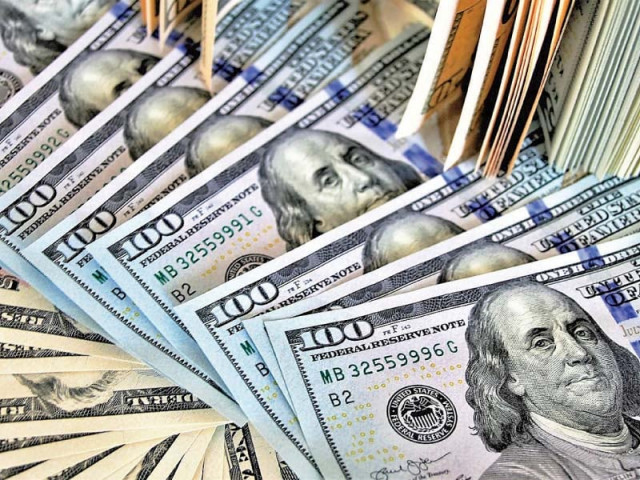PTI govt approves $1b crisis response loan from ADB
Imran's govt wants to take loan to build Pakistan's foreign exchange reserves

The CDWP recommended the operationalisation of Green Line Bus Rapid Transit Karachi project to Ecnec for approval. The total cost of the project is roughly Rs11 billion. PHOTO: FILE
The Central Development Working Party (CDWP) approved the special policy-based lending that the Pakistan Tehreek-e-Insaf (PTI) government wanted to avail to build the country’s foreign exchange reserves. The Ministry of Finance moved the summary to the CDWP for seeking its nod.
In addition to that, the CDWP meeting, presided over by Planning Commission Deputy Chairman Jehanzeb Khan, approved five projects of Rs11 billion and recommended two projects of Rs25 billion to the Executive Committee of National Economic Council (Ecnec) for consideration.
Islamabad has formally requested the Manila-based lending agency to provide the loan through a special policy-based lending instrument. It is a crisis response facility offered by the ADB as part of its international rescue efforts to help nations meet foreign payment obligations.
It is for the first time in Pakistan’s history that it will avail the crisis response facility to repay its foreign debt and build foreign currency reserves. The ADB board of directors is tentatively scheduled to meet in the second week of November to approve the crisis response loan - days after completion of the first review of the International Monetary Fund (IMF) loan programme for the July-September quarter.
The ADB has attached conditions of fiscal consolidation, strengthening of social safety nets, prudent debt management, a flexible exchange rate regime and comprehensive energy sector reforms in return for the $1-billion emergency lending, according to a concept clearance note.
Most of these conditions are already part of the IMF’s 39-month programme and the government is in the process of implementing them.
In its concept note, the Ministry of Finance stated that the economy was plagued with numerous deep-seated structural problems, which had gone unaddressed for years and adversely affected performance of the economy.
Owing to these imbalances, Pakistan, which was once the fastest growing economy in the region, is now among the slowest growing countries in South Asia.
In its Asian Development Outlook Update, released on Wednesday, the ADB projected that Pakistan’s economy would grow at a pace of 2.8% - the lowest in South Asia. Inflation rate is projected at 12% by the ADB - the highest in South Asia.
The finance ministry stated that due to high fiscal deficits and financing requirements of state-owned enterprises, the share of government borrowing in the banking system credit, including the State Bank of Pakistan (SBP) and commercial banks, increased from 35% in 2005-06 to 74% in 2017-18.
The finance ministry claimed that because of its growing needs, only 26% of the banking system credit was available for the private sector, which adversely affected private investment in the country.
“Without a government-managed adjustment, the foreign exchange reserves would have forced the government into a default on its debt servicing and other payment liabilities, making it extremely difficult for it to raise direly needed finances from abroad,” according to the concept clearance note for the $1-billion financing.
The ADB and the World Bank had suspended Pakistan’s budgetary support in 2017 after its macroeconomic conditions started deteriorating. However, the ADB in July this year approved a $500-million budgetary support for the first time in over two years.
Other agenda
The CDWP approved two projects related to the energy sector. It endorsed a 500-kilovolt electricity sub-station project worth Rs7.2 billion.
The objective of the project is the conversion of a 500kv switching station at Moro to meet the growing power requirement of Sukkur Electric Power Company (Sepco) including a 132kv grid station at Kandiaro and Naushehro Feroze in the jurisdiction of Sepco.
The project of Expo Centre Quetta worth Rs2.5 billion was also approved in the meeting. The project envisages construction of two exhibition halls each having 45,000 square feet floor area along with a convention centre and allied facilities having covered area of about 200,000 square feet over 200 kanals of land in phase-I.
The CDWP recommended the building of a sewerage system in Lahore worth Rs14.1 billion to Ecnec for approval. It also recommended the operationalisation of Green Line Bus Rapid Transit Karachi project to Ecnec. The total cost of the project is roughly Rs11 billion.
A project related to education was presented in the meeting, namely the establishment of a national curriculum council worth Rs239 million, and was approved by the CDWP.
The nature of the project suggests that it should not be part of the development programme and be financed from the recurring budget of the ministry.
Published in The Express Tribune, September 26th, 2019.
Like Business on Facebook, follow @TribuneBiz on Twitter to stay informed and join in the conversation.





1733130350-0/Untitled-design-(76)1733130350-0-208x130.webp)











COMMENTS
Comments are moderated and generally will be posted if they are on-topic and not abusive.
For more information, please see our Comments FAQ